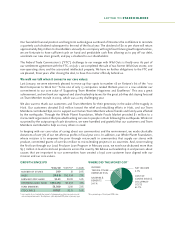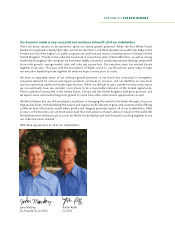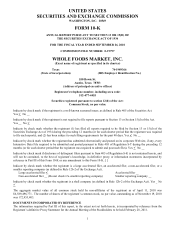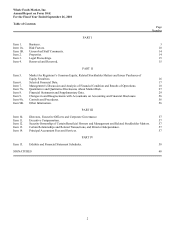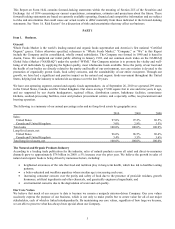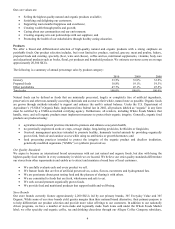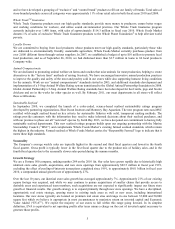Whole Foods 2010 Annual Report Download - page 15
Download and view the complete annual report
Please find page 15 of the 2010 Whole Foods annual report below. You can navigate through the pages in the report by either clicking on the pages listed below, or by using the keyword search tool below to find specific information within the annual report. 9
Healthy Eating Education
We are providing a revolutionary educational program in our stores to encourage healthier lifestyles. Our new Health Starts
HereTM program consists of a simple approach to eating, paired with practical tools and valuable resources, rooted in our four
principles:
• Whole FoodTM: Opt for whole, fresh, natural, organic, local and seasonal foods that are not refined or highly
processed.
• PLANT-STRONGTM: Simply put, eat mostly plants. Eat more vegetables, fruits, legumes and beans, nuts, seeds and
whole grains.
• Healthy Fat: Get your fats from plant sources, such as nuts and avocados. Alternatively, if eating a diet that includes
animal products, choose leaner meats and seafood.
• Nutrient Dense: Choose foods that are rich in nutrients when compared to their total caloric content, building menus
that ensure highly nutrient-dense meals.
The program includes, among other things: in-store healthy eating centers to display books and answer questions about
healthy eating and cooking ideas; store tours focused on making healthy eating choices; and a wide variety of educational
opportunities for team members, along with healthy eating classes and networking opportunities for our customers. We
believe our “Health Starts Here” initiative will grow and evolve over time to become a key competitive advantage for us, and
by offering an informed approach to food as a source for improved health and vitality, we will help change many more lives
for the better.
Whole Planet Foundation®
Created in 2005, the Whole Planet Foundation is an independent, non-profit organization whose mission is to empower the
poor through microcredit, with a focus on the developing-world communities that supply our stores with product.
Microcredit is a system pioneered by Professor Muhammad Yunus, founder of the Grameen Bank in Bangladesh and co-
recipient of the 2006 Nobel Peace Prize. The philosophy behind microcredit is to provide the poor access to credit without
requiring contracts or collateral, enabling them to lift themselves out of poverty by creating or expanding home-based
businesses. Whole Foods Market covers all operating costs and the overhead budget for Whole Planet Foundation, funded in
part by the sale of products under the Company’s Whole Trade Guarantee program as well as support from customers,
vendors, and team members. As of September 26, 2010, the Whole Planet Foundation has partnered with various
microfinance institutions to support over $12.4 million in grants in 20 countries where the Company sources products. Over
95,000 people (91% women) have received loans which are being used for home-based businesses including poultry and pig
farming, agriculture, furniture making, tailoring, and selling handicrafts, homemade and bakery-made foods, clothing and
footwear. It is estimated that each woman supports a family of five, which means our support is indirectly contributing to the
prosperity of approximately 477,000 individuals.
Green Mission®
We are committed to supporting wise environmental practices and being a leader in environmental stewardship. Over the
years, we have purchased over 2.8 billion megawatt hours of wind-based renewable energy, earning six Environmental
Protection Agency (“EPA”) Green Power awards from 2005 through 2010. We have 14 stores and one distribution center
using or hosting rooftop solar systems, three stores with fuel cells, and a commissary kitchen that soon will be using biofuel
from internally generated waste cooking oil. We have made a commitment to reduce energy consumption at all of our stores
by 25% per square foot by 2015, and we build our new stores with the environment in mind, using green building
innovations whenever possible. Eleven of our stores have received Leadership in Energy and Environmental Design
(“LEED”) certification by the U.S. Green Building Council, and two stores have earned Green Globes from the Green
Building Initiative.
We discontinued the use of disposable plastic grocery bags at the checkouts in all stores in 2008 and pay at least a nickel per
reusable bag refund at the checkout. We also were the first national retailer to provide Forest Stewardship Council (“FSC”)
certified paper bags originating from post-consumer recycled fiber. Nearly all of our stores are involved in a recycling
program, and most participate in a composting program where food waste and compostable paper goods are regenerated into
compost. Additionally, in 2007 we introduced fiber packaging in many of our prepared foods departments that is a
compostable alternative to traditional petroleum and wood- or tree-based materials. We also are working to eliminate the use
of Styrofoam in packing materials shipped to our Company and in product packaging in our stores.


